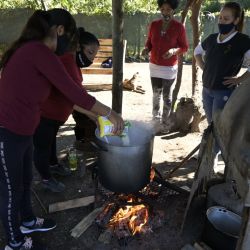Elena González's backyard soup kitchen is a hive of activity, with busy hands chopping and stirring as a cauldron with a bit of chicken and a lot of rice boils over a wood fire.
González's soup kitchen in a poor neighbourhood of Belén de Escobar, some 55 kilometres (34 miles) from Buenos Aires, is one of more than 1,500 in the country of 45 million. It’s already been running for more than eight years.
Argentina has a long history of high inflation – prices rose by more than 50 percent last year – but the country is going through a particularly rough patch, worsened by the global repercussions of the war in Ukraine.
With food prices in the country rising 20 percent in just the first three months of the year, a complex network of public and private organisations is required to feed millions of increasingly hungry mouths.
"The situation is getting more and more complicated," said González, an activist with the Barrios de Pie social organisation.
From a combination of state aid, private donations, contributions from local residents, a communal vegetable garden, three geese and a few chickens, she manages to put food on the table.
González says she cannot afford to miss a day of cooking. "The local children would come to my door to demand their plate," she explains.
Her soup kitchen receives help from Barrios de Pie, the social movement born from Argentina’s worst-ever economic crisis 20 years ago, and for which the need has never abated.
It is an essential cog in the wheel of citizen mobilisation topping up the public aid on which more than four million people depend, according to official figures.
Although Argentina has a well-oiled network of welfare support, the fight against high prices is arduous. Recently, the government has had to increase by 50 percent – to between US$78 and US$156 per month – the food stamps that some 2.4 million households rely on.
Another 300,000 mouths are fed at 15,800 school canteens, while yet more get their daily meal from religious organisations and NGOs, including the United Nations Development Programme (UNDP).
Local shops fill in some of the remaining gap, delivering unsold food to soup kitchens or sometimes directly to households in need.
'Hanging in there'
"Argentina has a much larger social safety net than other Latin American countries," sociologist Ricardo Rouvier of the University of San Andrés told AFP.
But the country is facing a dilemma: it has to limit public spending because of commitments to the International Monetary Fund under a recent deal to refinance the country’s US$44.5-billion debt.
And things are likely to get worse with the Ukraine war fuelling global price inflation hot on the heels of the coronavirus pandemic's economic ravages.
A UN report on Wednesday projected GDP growth of three percent for Argentina for 2022, and warned of "sustained high inflation" and likely higher unemployment rates.
This is what makes private initiatives so critical. But they, too, are struggling, with "inconsistent" public aid, said Silvia Saravia, coordinator of Barrios de Pie.
"We have a lot of difficulties with regard to state assistance to canteens and soup kitchens. We are hanging in there. We have to, because there is a need," she explained.
"We never know exactly what we are going to have. So, how do we survive? How do we have so many soup kitchens and social community kitchens? Partly... because the families in the neighbourhood understand that by cooking together they will be able to eat better than cooking separately."
For the past two years, Barrios de Pie has been promoting community vegetable gardens. They have 90 on the outskirts of Buenos Aires and more than 900 across the rest of the country. In Elena González's garden, they have planted lettuce, chard, beetroot and beans.
NGOs and private soup kitchens "are the real heroes of this story," said Virginia Ronco of the Munro Food Bank -- the country’s largest – which feeds about 340,000 people a day, thanks to contributions from supermarkets, agribusiness companies and other donors.
"They are cooking day in and day out with the little resources they have. Even in situations of great vulnerability, they put a lot of heart and ingenuity into their work," she added.
State aid to the poorest sectors began during Raúl Alfonsín’s 1983-1989 government following the return to democracy. With the 2001 crisis, welfare support was deepened and it is currently going through one of its peaks, said political analyst Carlos Fara.
"We are in a situation in which the economy is growing, but with very high inflation. This has a social impact, because poverty [currently at 37 percent] is income-based," he warned.
related news
by Nina Negrón, AFP
























Comments